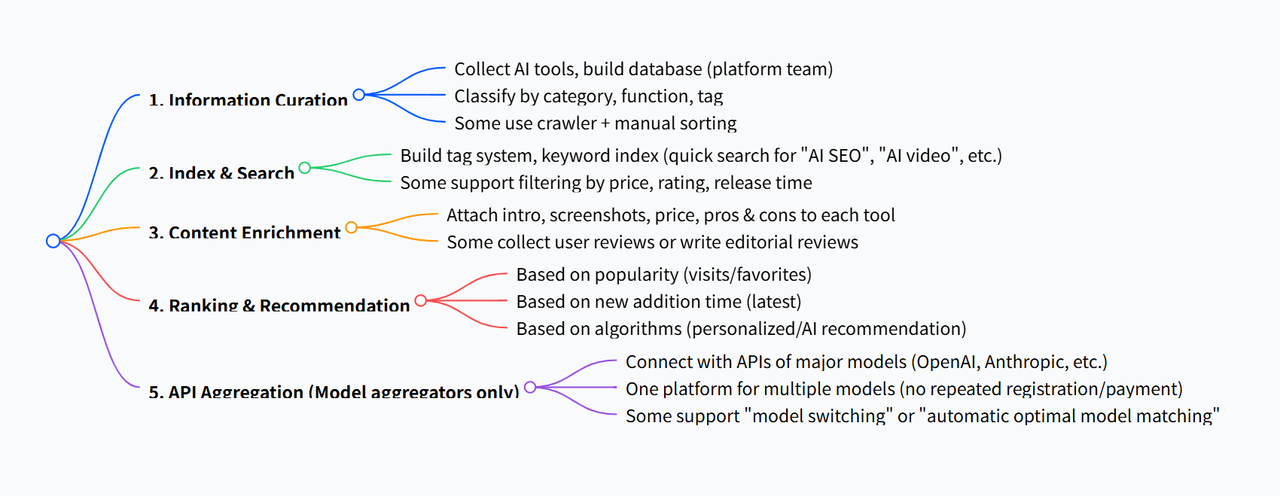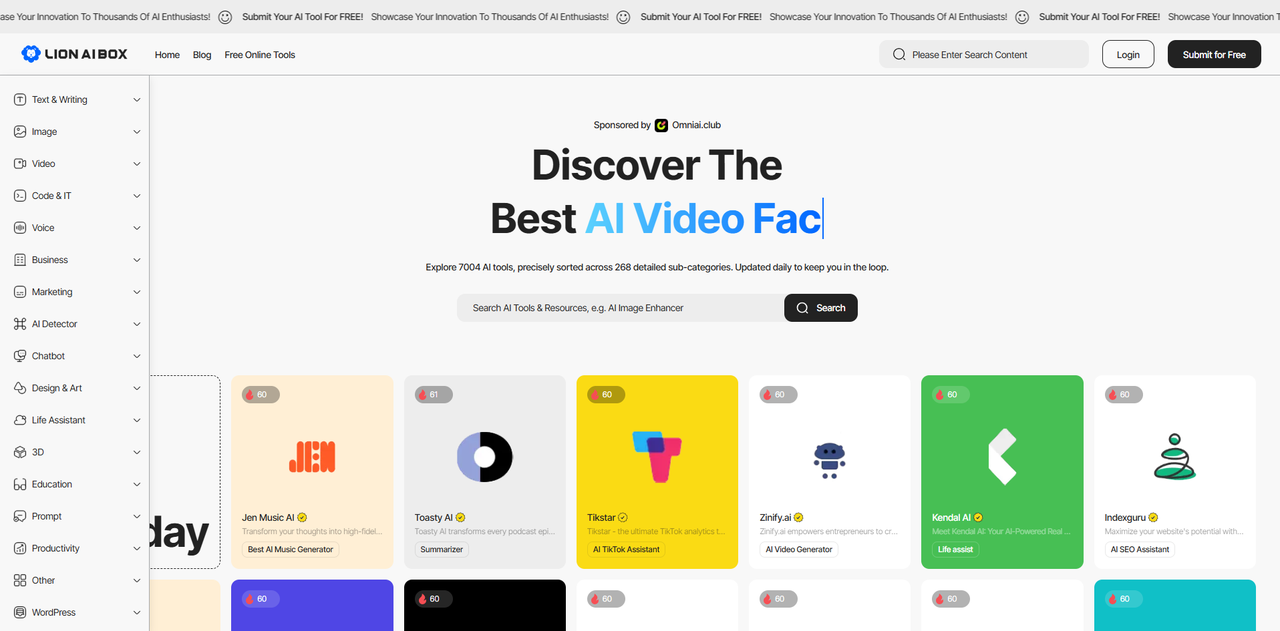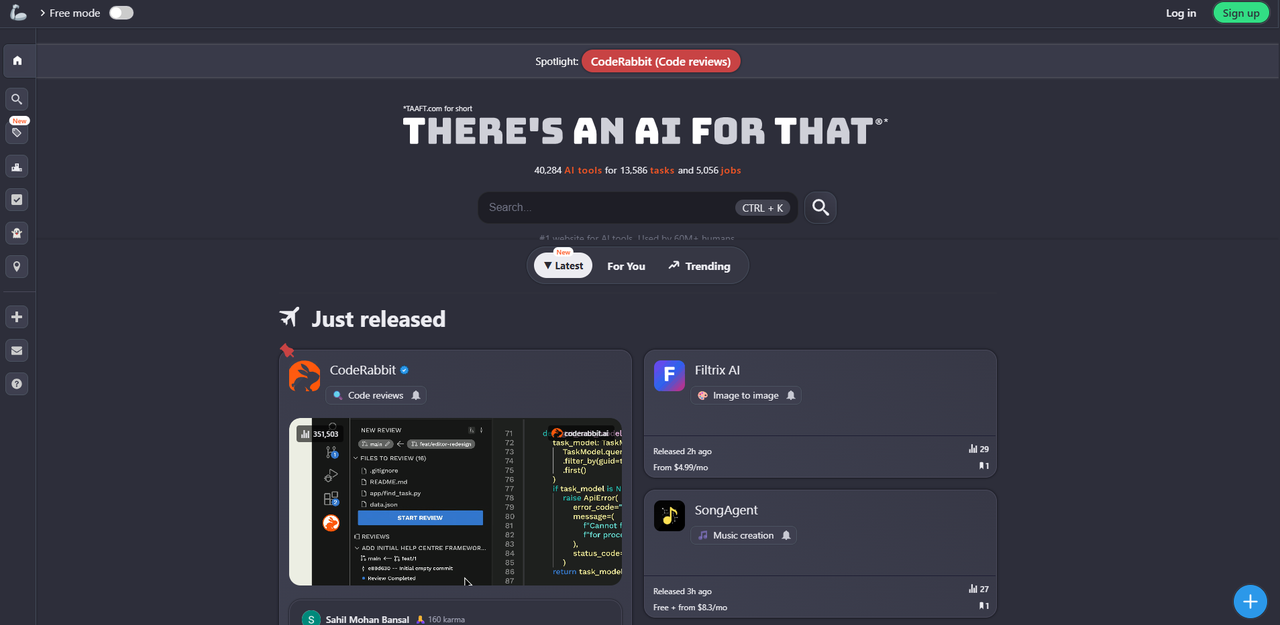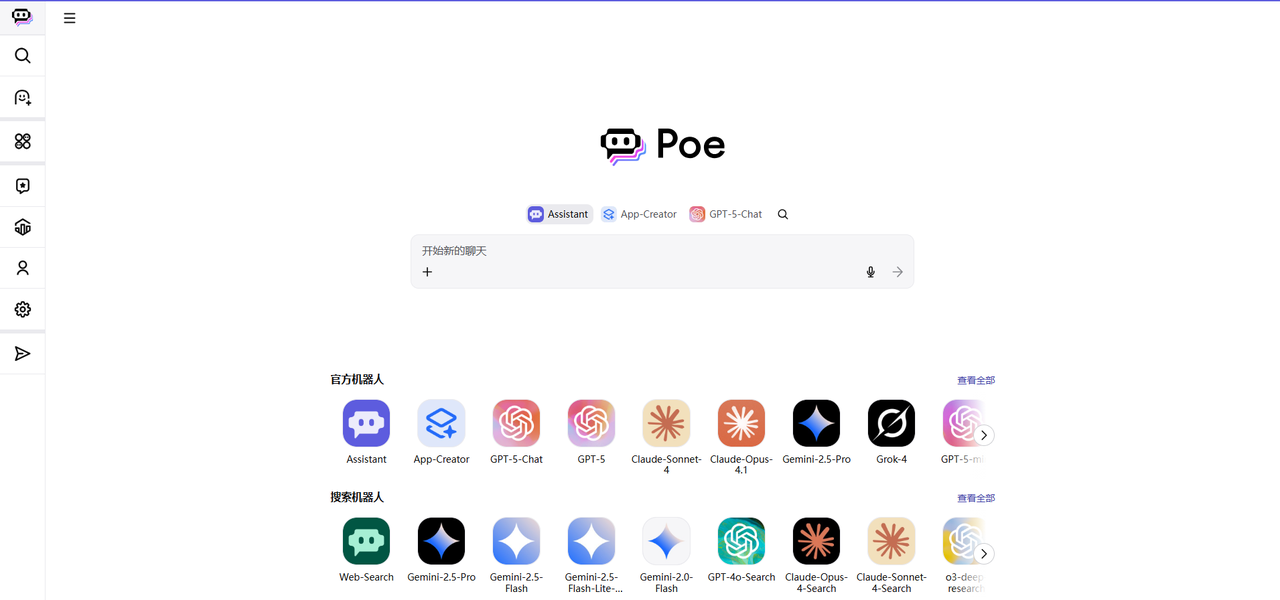AI models are constantly being updated and upgraded, and various types of AI tools are emerging one after another. This raises an inevitable question - price.Yes, if you want to experience and compare the functional differences and output effects of different models, you will have to pay for each tool to deeply experience their effects. Or perhaps you want to try out different types of artificial intelligence, but are not content with just the recommendations on various blogs and posts? Perhaps you should give AI Tool Aggregator a try.
Overall, AI tools aggregator usually has the following several functions:
1.Tools collection and classification——Classified either by AI function or by use scenario, different AI aggregators organize AI tools in different ways to facilitate user queries.
2.Search and Filter——They label AI tools for easy retrieval and visibility for users.
3.Comparison and Evaluation——Provide an introduction to the functions of the tool, a pricing plan, and an analysis of its advantages and disadvantages.
4.One-stop navigation——There's no need to switch pages. All the tools you want can be found in one platform
In this article, I will categorize AI tool aggregators into three types. Let's take a look together

The first type of AI tool aggregators: Directory Aggregator
The most classic AI tool aggregator is the directory type.Directory Aggregator is the application store for AI tools. In this store, you will see AI tools classified by different usage functions, ranging from writing to image generation, from design assistants to code assistants. You can find the suitable tool according to your unique needs. Directory Aggregator usually provides an introduction to AI tools, their prices, usage scenarios, and official website redirects. With this information, you can have a general overview of AI tools and find different AI products to compare. The following are several recommended directory aggregators, which usually provide ai tools ranking lists.

Lion AI Box is an AI navigation station with over 7,000 (still under continuous update) AI tools. Its page is simple and lively yet powerful. In the sidebar, you can see 18 first-level navigation categories, which are further divided into 267 second-level categories. There is always one category that interests you. Lion AI Box is committed to creating a AI tool aggregator that is continuously updated and classified in detail.With its user-friendly interface, the platform allows smooth navigation, whether users are looking for coding assistants, design tools, or customer support automation tools.
Toolpilot
Toolpilot rather than the app store, it's more like a filter. Here you can filter based on your price budget, usage goals, compatibility, and whether you can use the API, among other conditions.This makes it completely different from the "shelf-style" display of traditional app stores. Whether you are looking for a free prototyping tool that seamlessly collaborates with Figma or a project management software that supports API integration and is paid for annually, you can instantly narrow down your selection range from thousands of applications to just a few of the most relevant options by combining filtering conditions in this AI tool aggregator.
The second type: Trend / New Release Aggregator
Trend/New Release Aggregator is always updated with the latest AI tools in real time and tracks the cutting-edge of emerging AI news. This kind of AI tool aggregator is especially applicable to AI enthusiasts, technology media, etc., as they will take you to the forefront of technology.This function acts as your personal radar for the vast and rapidly evolving AI landscape.While the main filtering tool helps you find what you know you need, the Trend/New Release Aggregator exposes you to what you don't yet know exists.
The following is my recommendation on Trend/New Release Aggregator:
There’s an AI for That

Obviously, There's an AI for That focuses on the cutting-edge of AI. When you log in to the website for the first time, it will ask for your personal preferences, and then make relevant recommendations on the homepage based on your preferences.Click subscribe, and you can also receive the latest information on AI tool updates. If you are also such a person who follows the "new", you might as well take a look!
The third type: Model Aggregator
Unlike the previous two, Model Aggregator is not just a tool navigation. It can also switch between different versions of large language models (such as ChatGPT, Claude, Gemini, Perplexity, Grok, etc.) on the platform.This is perfect for developers.
They will use special algorithms to come up with solutions - how to allocate tokens among different large language models to achieve the best cost performance. In this way, users do not need to recharge each model on different platforms. You only need to solve all problems on one platform.
However, this also brings about a hidden problem. When you use third-party services, you might actually pay for the development fees of the third-party platform and so on, but you may not be aware of it. Therefore, the final cost-effectiveness still depends on your own consideration: efficiency or cost, which one do you need more? In the Model AI tool aggregator track, the most representative platform is undoubtedly Poe.
Poe

Poe enables users to easily browse different large language models and compare them, so that users can find the robot that best meets their needs. The truly cool thing about Poe is that it allows people to create their own robots using custom prompts! This feature not only saves time but also enables users to customize the chatbot experience according to their unique needs. No need to copy and paste the same prompt over and over again!
Making it easy for people to access and interact with various large language models is of great significance to the entire ecosystem. By simplifying the process and providing a user-friendly platform like Poe, more people can explore and leverage the potential of AI chatbots.
Final summary
The above are the different classifications of ai tool Aggregators. In a nutshell:
- Directory Aggregator is like a tool app store —— solving the problem of "where to find tools".
- Trend/New Release Aggregator like new product tracking —— Solving the question "What are the latest tools?"
- Model Aggregator is like multi-engine search —— solving the problem of "which model is the most suitable".
- For those who are trying to use the AI tool aggregator for the first time, I would recommend Lion AI Box. It can not only help you search for the AI tools you need, but also give you a macro understanding of the AI "blue ocean". Meanwhile, Lion AI Box also has a secondary section called AI Tools Directory, where you can discover more similar AI tool aggregators.Believe that you can always find your own best AI tool aggregator! Let technology change life!
 Submit Your AI Tool For FREE!Showcase Your Innovation To Thousands Of AI Enthusiasts!
Submit Your AI Tool For FREE!Showcase Your Innovation To Thousands Of AI Enthusiasts! Submit Your AI Tool For FREE!Showcase Your Innovation To Thousands Of AI Enthusiasts!
Submit Your AI Tool For FREE!Showcase Your Innovation To Thousands Of AI Enthusiasts! Submit Your AI Tool For FREE!Showcase Your Innovation To Thousands Of AI Enthusiasts!
Submit Your AI Tool For FREE!Showcase Your Innovation To Thousands Of AI Enthusiasts! Submit Your AI Tool For FREE!Showcase Your Innovation To Thousands Of AI Enthusiasts!
Submit Your AI Tool For FREE!Showcase Your Innovation To Thousands Of AI Enthusiasts! Submit Your AI Tool For FREE!Showcase Your Innovation To Thousands Of AI Enthusiasts!
Submit Your AI Tool For FREE!Showcase Your Innovation To Thousands Of AI Enthusiasts!







No comments yet. Be the first to comment!